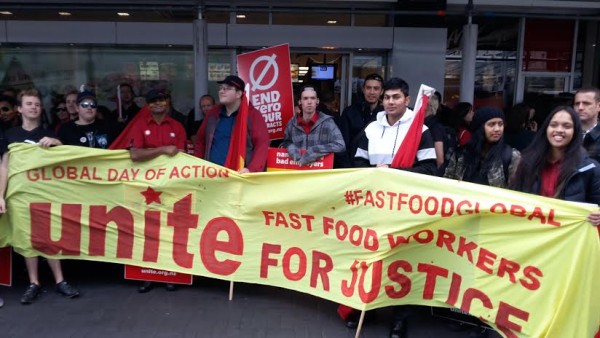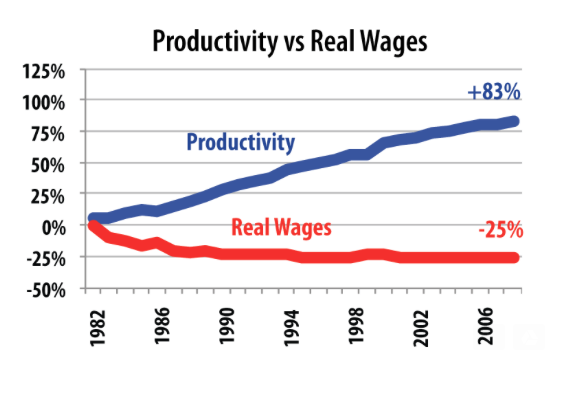This is the first of a series of articles based on a speech to a conference sponsored by the Child Poverty Action Group looking at work and welfare in the 21st century.
Over the last three to four decades there has been a huge expansion of casualised work across the globe.
A recent International Labour Organisation (ILO) report found that only one in four workers had a stable job.
“The rise in informal employment, undeclared and temporary work arrangements, as well as involuntary part-time work, has contributed to the widening of income inequalities, which have been recorded in the majority of countries” noted Guy Ryder ILO director General.
In NZ the Council of Trade Unions (CTU) reports “At least 30% of New Zealand’s workers – over 635,000 people – are in insecure work. We believe it may well cover 50% of the workforce. 95,000 workers have no usual work time, 61,000 workers have no written employment agreement, 573,000 workers earn less than the Living Wage and almost a quarter of a million Kiwi workers say they have experienced discrimination, harassment or bullying at work.”
As the CTU comments: “Whether we call it casualisation, precarious work, temporary, or non-standard work – it means that workers have worse conditions, less security, less say and are more vulnerable. That may suit the boss – but it is unfair and does not work for workers.”
Unite began organising workers in fast food, the tourist hotels, the Casino, security, English language schools and call centres just over a decade ago.
We discovered a world of insecure work, no guaranteed hours, with workers completely at the whim of the boss to use and abuse as they saw fit.
We have been fighting tooth and nail for a decade to change these practices. Progress was made in many areas but we found the one issue the employers refused to budge on was what they called “flexible rostering”.
Only this year when we named the reality of life for our members as “zero hour contracts” did we get the breakthrough in the media and public consciousness needed to force the employers to finally end this practice.
When I started organising workers I was genuinely shocked at how far the basic rights of working people had been pushed back.
I grew us in a world completely different. We had full employment so that I could work full time in every school or university vacation from the age of 15. I could pick and choose part time work during term time. I worked in freezing works, a glass factory, warehouses, construction sites. I had union protection on every job I ever worked at until the 1990s.
During the relatively brief periods of unemployment I had access to an unemployment benefit. I remember as a 16 year old getting $15 a week. That was equal to the rent of a three bedroom Mt Eden home. I know that because I paid $5 a week for a big double room.
Health care and education were free in reality not just theory. Accessibility was an issue but I still managed to get a relatively minor nose job done in a public hospital.
In this world unions prospered, inequality was reduced, and wages steadily grew. Official statistics in New Zealand show real wages peaking in 1982.
The ruling rich hated this world and sought to destroy it. The sad truth is they have been largely, though not completely, successful.
Technology helped this process from the bosses viewpoint. Computers and the software needed for just in time manufacturing suited just in time rostering as well. They knew that having workers desperate for hours strengthens the bosses hand. It is very difficult for workers to assert their rights to fair treatment, appropriate breaks and join a Union when the boss can retaliate by cutting hours.
But technology required a fundamental change in class power relationships for it to be used effectively. The bosses had to break the power that working people had accumulated during the three decades of economic expansion following World War II.
That expansion and the reduced levels of unemployment, as well as the fear of the Soviet Union, saw the rulers of the advanced capitalist countries in Europe, the US, Japan and Australasia make many concessions – including many of the main features of the Welfare States as we know them – that they regretted and sought to reverse as soon as conditions allowed.
Those conditions to reverse gains made by working people followed the period of renewed economic crises from the mid 1970s that reproduced a reserve army of unemployed. Mass unemployment could be used to break unions and tame workers.
It is much harder to go on strike or tell the boss to shove it when there is a queue of workers outside the doors wanting your job. Bosses love it when they can point to the unemployed and threaten you with being replaced if you get too uppity.
The goal of the bosses was simple – to reduce real living standards of workers by reducing wages and dismantling welfare – especially assistance to those who could not work.
The combination of anti-union laws and a long recessions during the late 1980s and early 1990s saw union coverage in the private sector reduced from 50% to 10% of all workers.
Real wages in New Zealand were cut 25% by the early 1990s and have only recovered a little (if we use the Quarterly Employment Survey) or not at all (if we use the Labour Cost Index) to measure changes since then.
To help the process of cutting wages the minimum wage was frozen for 8 of the nine years in government for the 1990 National Government. The one year there was an increase was when Winston Peters was in coalition. The real vale of the minimum wage dropped from 50% of the average wage to 30%.
Between 1978 and 2011, aggregate labour productivity in New Zealand grew by an average of 2.73% a year according to a recent Productivity Commission report. At that rate each individual worker is producing twice as much output every 25 years.
Since we know that none of that productivity gain has been given to workers we know that all that gain has been captured by the employers of labour power.
Not surprisingly, as a consequence of this process, there has been a massive shift of wealth from workers to bosses.
The July CTU Economic Bulletin calculates that “labour share of income fell from approximately 60% of income in early 1980s to 46% in 2002 – a loss to wage earners of about a quarter of aggregate income. It then recovered to around 50% – a sixth lower than the 1980s. In current dollar terms, that is a loss of about $19bn per year or $10,000 per wage earner per year. The present value of the loss over that period is estimated at between $660bn (invested in term deposits) and $1,200bn (paying off mortgages) or 3 to 5 times GDP. New Zealand’s labour share is very low by developed country standards: Piketty considers 60-70% typical. In United Nations comparisons, only Chile and Mexico are lower among OECD countries.”
This is actually the first time in the history of capitalism in NZ where the real living standards of working people has not increased from one generation to the next.
When the bosses tell us they can’t afford a pay rise they are lying. And when the government tells us they can’t afford welfare for the poor it is because they have cut taxes for the rich.
The problem is not “can we afford it” but who controls that additional wealth being produced by society.
Discussing this process in the USA one of that country’s richest men commented: “There’s class warfare, all right, but it’s my class, the rich class, that’s making war, and we’re winning.”
How we can defeat that class war being against us will be the topic of future blogs.








I find it deeply saddening that for so many now, this is the norm. Just the other day I heard someone (forgotten who) on the radio speaking on the economic jitters around, quoting all the “positives” we had that should see us through. One of them was, our “flexible” work force. I can honestly say I felt my heart sink when I heard that, but again, for many now, that is the norm, they are not old enough to know there was something different from that.
The other thing that deeply saddens me that goes hand in had with this “flexible” workforce is, of course, us becoming a nation of tenants. It is not difficult to see how “flexible” workforce and low home owner/occupier rates go hand in hand, I mean if you are tied to a home your own, you can hardly be “flexible” now, can you?
At the risk of being a broken record, I think part of the solution is to experiment with new ways of organising work. Examples include Mondragon in Spain, SemCo in Brazil, the South Mountain Company, and Morningstar in the US, and here in Aotearoa, Loomio and the other Enspiral companies, Tui Balms. Not to mention the thousands of worker-owned cooperatives whose products are sold under Fair Trade labels.
As Ricardo Semler of SemCo says in his book ‘Maverick’, workers employed in democratic workplaces and cooperatives can still join their trade union. Member-drive unions can benefit from the experience these workers bring of being part of a cooperative, and democratic business. Plus, employment disputes can still happen in even the most progressive, employee-driven organisation, and their workers can still benefit from the advocacy and solidarity unions provide.
Thanks Mike.Another nice resume of how we got to where we are.There,s a wh0le generation of workers who think the present situation is normal & unchangeable who need to know how recent it is.
LLoved the use of your experiences to show how life was before neoliberalism
For too long corporations have put their bottom line before their employees. The need to please shareholders has come at the cost of the workers. It’s this awful attitude of financial gain that is separating individuals and societies all over the world. Demonstrated by profit over people, over the last century we have lost our humanity and replaced it with capital gain. Greed over equality.
As history dictates, era’s end through revolution. The negative interpretation of this could mean death and war but the positive way, (the way I want it to happen) is a shift in attitude towards how business is done. Put the people first, investing in the person leads to a sustainable workforce.
New Zealand has the opportunity to learn from other countries mistakes, listen to the people, don’t follow in the footsteps of America. There needs to be greater corporate social responsibility resulting in the benefit of the masses and not just the benefit of the 1%.
By investing in companies that put employees and society before profit creates the fundamental shift in attitudes needed, the ripple effect will reach far more people.
Its time those who can should. The fourth estate has to be held accounted for and fulfil their duty to the general public, not filling channels with brainwashing nonsense like a flag debate! Bring the real issues of importance into the public sphere and provide the people with a voice, we know we get the short straw and are sick of it!
Comments are closed.